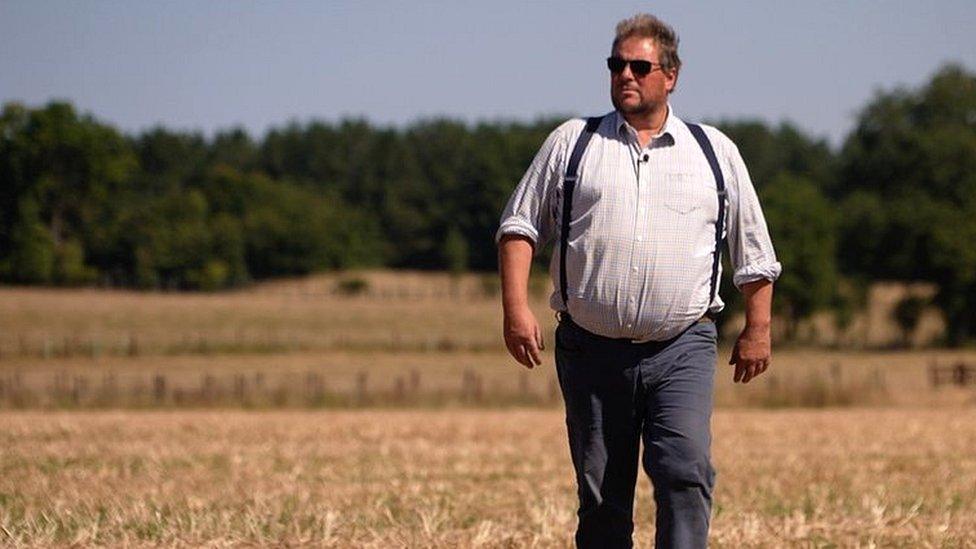UK wildfires: Firefighters on tackling flames moving faster than you can run
- Published
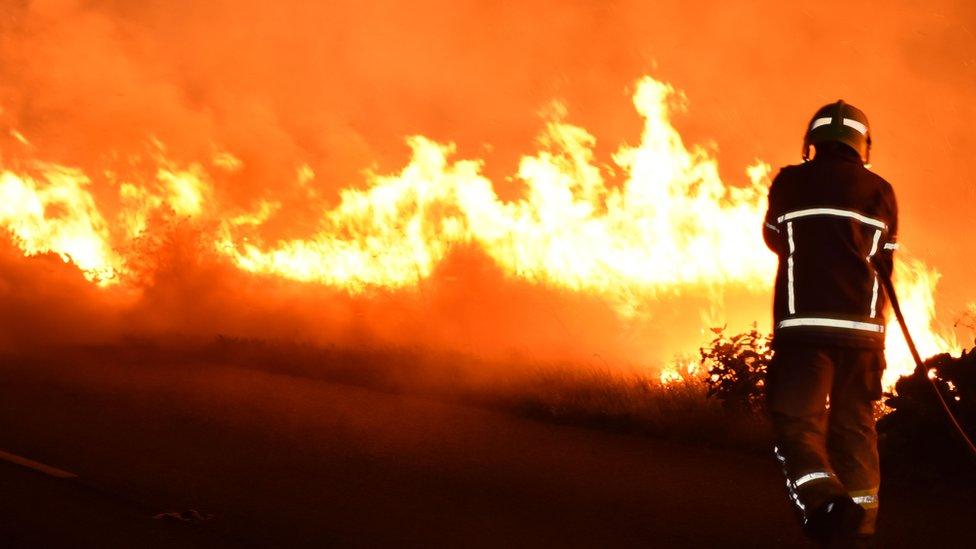
Wildfires are becoming more frequent across the UK
In the middle of nowhere, two-metre high flames above your head, a fire moving faster than anyone can run.
The challenges firefighters in the UK face when confronted with large-scale wildfires are enormous.
Conditions are so brutal that the fires can take days to bring under control - an exhausting ordeal for even the most fit firefighter.
This July was the driest on record since 1935 in the UK, while this week's heatwave has led the Met Office to issue its most severe fire warning.
Richard Hawley, firefighter and wildfire officer at West Yorkshire Fire and Rescue Service, said the challenge facing crews across the country is "unprecedented".
"Wildfires are unlike any other fire we deal with", he said. "We have already surpassed the previous highs of last year.
"It changes on a minute by minute basis. One minute they are knee-high, the next they are above your head. It is one of the most arduous fires our crews face."
Wildfires spread rapidly - left unchecked, they can rage for miles and miles across the countryside. If the wind changes direction, so could the fire.
Crews often have to tackle them by hand, beating the ground to extinguish the flames.
"You can be walking for an hour before getting to the area you are going to be fighting," Mr Hawley said.
"You are using a beater and disrupting the fire gases to extinguish the fire. That is all with hand tools after walking for four or five miles with your boots, jacket and helmet on."
A large part of Mr Hawley's job is anticipating where the fire could move next. If the wind changes, the tail of the fire could become the head, leading it to spread rapidly in the opposite direction.
One particular fire which broke out last spring sticks in Mr Hawley's mind.
The blaze at Wessenden Valley on Marsden Moor, a National Trust site near Huddersfield, had been raging for a few days in April 2021 when he arrived at the scene at dawn.
It was spreading faster than anyone could move, but it was only when Mr Hawley took to the sky in a helicopter that the true nature of what lay ahead became clear.
"It must have been at least 2km," he said. "The scale of it was immense, the fire was moving every few hours."
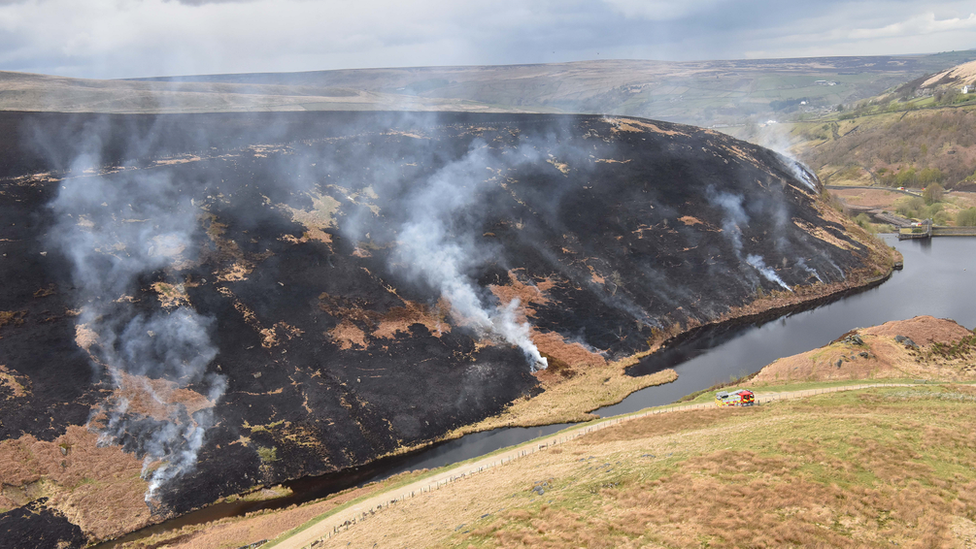
285 hectares of grassland was torched at Marsden Moor
Mr Hawley and his incident commander declared a major incident. More than 100 fire fighters arrived at the scene to bring the inferno under control - but there was a problem.
"For the first few hours, we could not even put any firefighters in where the fire was," Mr Hawley said.
"We could only use the helicopter to put it out."
He and the rest of the team had to act quickly. Not only was the fire heading towards a number of homes and a golf course, but a separate fire was also raging just a few miles away.
"Two separate fires naturally pull each other together.
"It was a battle to get our fire out before it could reach the other fire and become a much larger problem.
"We knew there was also going to be a change in wind direction at 2pm. We had to extinguish it before then when it would have become the head of the fire and have gone unchecked for miles and miles of moorland."
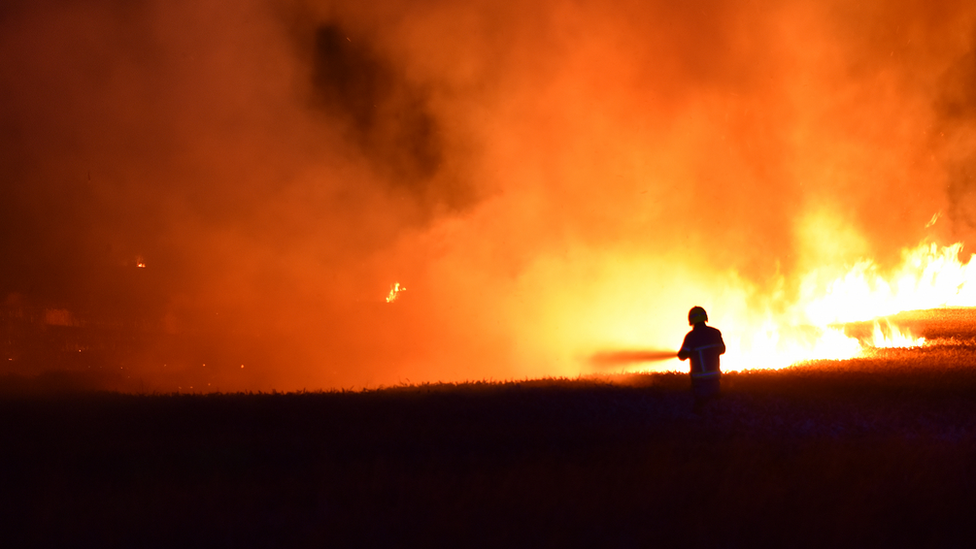
A fire at Pontefract in West Yorkshire
The fire at Marsden Moor was started by Viktor Riedly, who lit a fire cracker at Black Moss Reservoir on 25 April 2021.
The stunt went wrong, and despite his desperate attempts at putting it out, it was too late. By the time the fire was eventually brought under control, 285 hectares of the moor had been torched.
Riedly, from Huddersfield, was jailed for 12 months after admitting arson.
It was the largest blaze Mr Hawley had tackled as wildfire officer, but he said fire services across the country are now experiencing incidents on this scale more often.
"Even on Monday, we had three significant fires - that's just an average Monday night," Mr Hawley said.

Tips for avoiding wildfires
Dispose of cigarettes properly as when dropped on dry grass and not extinguished they are very likely to cause a grass fire
Cigarettes dropped out of car windows can also land on dry grass by the roadside
Throw empty glass in the bin, as when left in parks they can magnify the sun and start a fire
Do not use disposable barbecues in parks and open spaces, as smouldering ash and embers carried by the wind can set fire to dry grass
If you do decide to use them, make sure they are put right out and cooled before being thrown away
Do not leave camp fires unattended or barbeques unattended and extinguish them properly when finished
Grass fires can spread extremely fast, so if you see dry grass smouldering call 999 immediately so firefighters can deal with it and stop it from spreading
Source: London Fire Brigade

Gloucestershire is not used to large scale wildfires, but even this pocket of southwest England is seeing an increase in the number of callouts this year.
"This time last year we had two fires involving farm land," said Richard Lockyer, Gloucestershire Fire and Rescue group manager.
"This year, we have had 34 already."
Just last week, crews were called to a 27-acre fire in the village of Didmarton, near Tetbury.
"With the wind conditions, it was spreading rapidly - as fast as you can walk if not quicker," said Mr Lockyer.
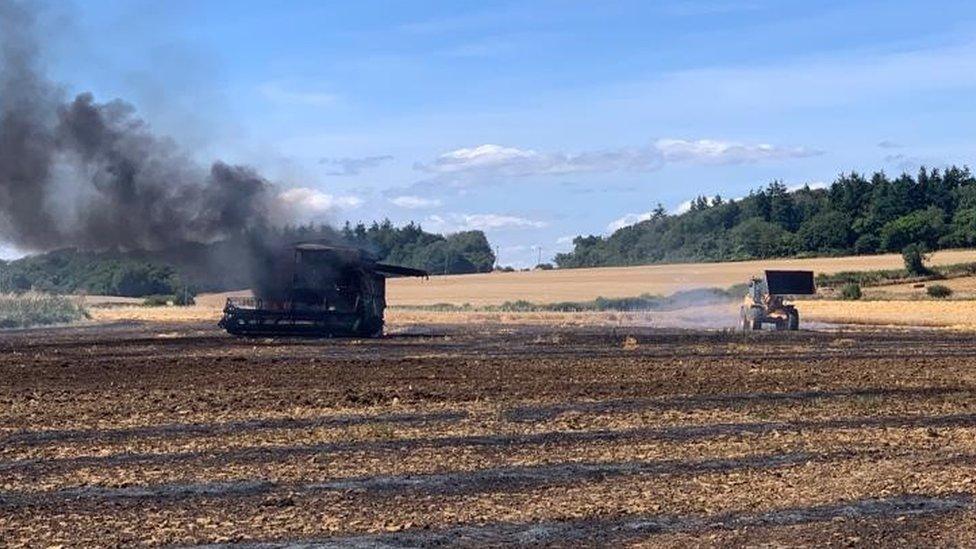
Farm equipment was damaged during a recent fire in Gloucestershire
As well as hand tools used to beat the fire, crews also used fire breaks to stop the blaze from spreading.
"They involve putting a lot of water down or using farmers to dig out the soil," he added.
"It is very arduous work in a very challenging environment. You have to carry yourself and your equipment.
"But fire fighters are very resilient. We join the job to help people and prevent property damage."
'400C temperatures'
David Escudier, area manager for Kent Fire and Rescue Service, is anticipating a busy week ahead after a July which saw a tenfold increase in the number of wildfires from last year.
"In July 2021, we had 44 crop or vegetation fires - in July 2022, that number was 400," he said.
"We have seen over the past 10 years a steady increase in the number of wildfires."
Temperatures can reach around 400C (752F) and fires can "travel faster than you can run", according to Mr Escudier.
"You know it is an exhausting job to go to, it tests the fitness of the most athletic firefighter," he added.
The average temperature of the Earth's surface has risen by about 1.1C since 1850.
Human-induced climate change means the frequency and duration of heatwaves in the UK is likely to increase.
It means the challenge of wildfires in the UK is one that fire crews across the country could be facing for years to come.
Related topics
- Published11 August 2022
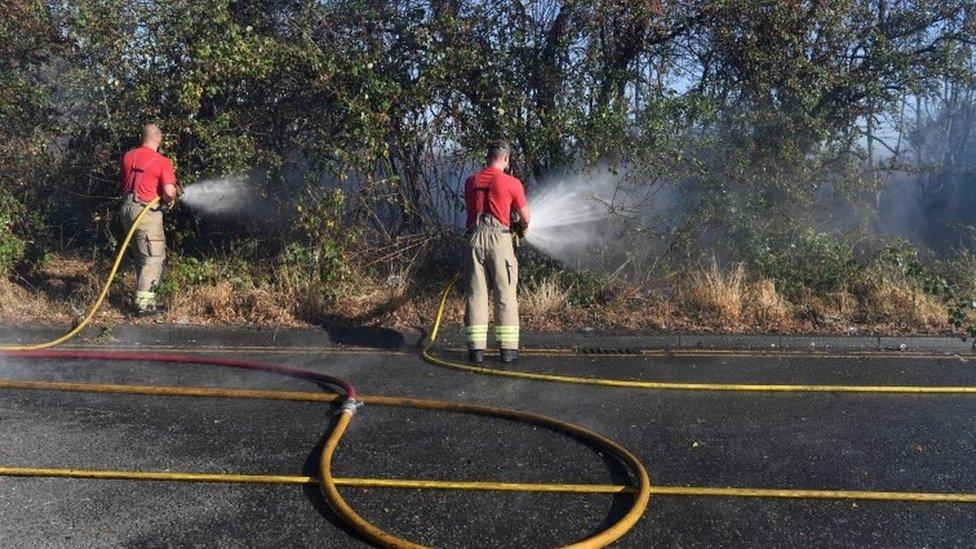
- Published11 August 2022
